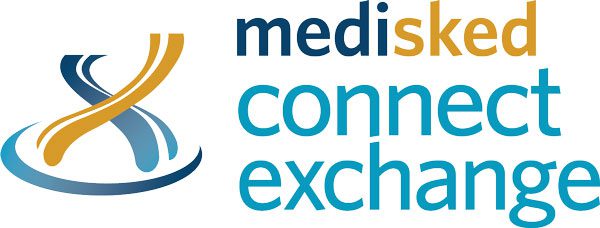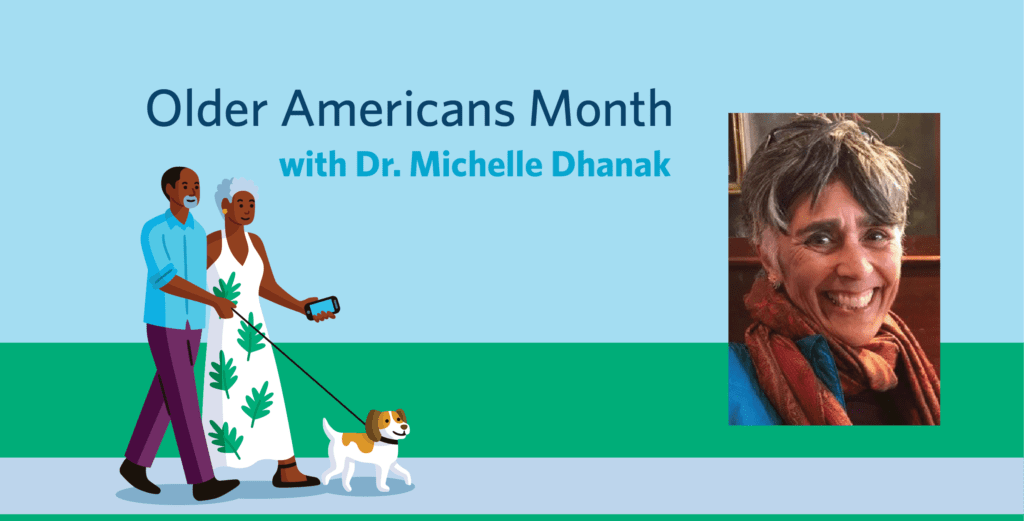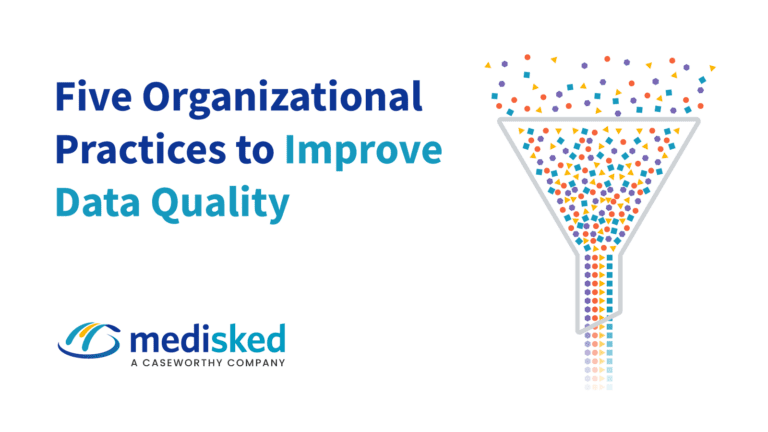May is Older American’s Month. In recognition, MediSked talked with Dr. Michelle Dhanak, a geriatrician in California, to learn about her unique approach to patient care, focusing heavily on interdisciplinary teamwork, as well as the social determinants of health (SDOH) and person-centered decision-making.
Question: We’d love to hear more about the interdisciplinary work you do as a physician. Can you elaborate on the working relationships you have?
Answer: About half of the patients I work with have care mangers because of their complex needs – and generally have 24-hour caregivers. Many of my patients have advanced dementia and limited ability to verbally articulate their needs. We use observation of facial expression, mood, vocalizations, and behaviors to help us understand how the person is doing. We really work together as a team. The care managers are working with me and the families and caregivers are all contributing different information based on what we know about how the individual is doing. Care managers often come to appointments and I always call them after every appointment, send them my notes and my orders. I often have care managers contacting me between visits to provide updates, so I have a truly holistic view of the patient.
Additionally, my connection with many caregivers is strong as well. Some people have incredible caregivers, and in those instances, I communicate with them when trying to understand how the individual is doing. It’s a very collaborative approach that utilizes the strengths and knowledge of every person in an individual’s life. Due to the nature of the remote practice, technology is a pillar of my work. All my notes are electronic. Everything is done online. However, often the communication with caregivers and patients happens over the phone or via email.
Question: You mentioned that you treat your patients holistically, rather than just focusing on specific medical conditions. How do you address the larger social determinants of health of your patients?
Answer: Social determinants of health (SDOH) are the backbone of geriatrics. There are 4 pillars of health – physical, mental, social and spiritual. In geriatrics, we assess and consider all 4 pillars when treating patients. When a comprehensive geriatric assessment is conducted, it goes beyond the typical health history to include important factors like:
- Who is in your life?
- What kind of social supports you have?
- How important are the social supports to you?
- Screening for elder abuse and neglect
- What are your goals?
- What are things in your life that are important to you
As you get to know a person, those social parts of them are key to understanding how changes may affect their overall health. For example, if a person loses their caregiver and they cited having a strong relationship with them, this could trigger a myriad of health issues. Understanding these other aspects is going to help get the individual through the change physically, cognitively, and emotionally.
Question: Do you work with any community based organizations or have other referral networks to help patients meet those needs?
Answer: We send patients and caregivers to group like the Alzheimer’s Association for patient and caregiver supports. We also have a strong referral network of mobile specialists who can treat patients in their homes. This includes specialties like mobile dentists, mobile podiatrists, mobile phlebotomist, mobile x-rays, etc.
Question: You’ve worked with different vulnerable populations throughout your medical career. What are the factors that you’ve found have the greatest impact on patient care?
Answer: Homelessness, drug addiction, reduced health literacy, and mental health issues are the top four. All of these lead to late diagnosis and increased morbidities.
Question: You worked as a physician in New Zealand for over a decade. How does that experience affect your current work in the United States?
Answer: First of all, geriatrics is very well developed in the Crown countries (the 54 nations of the Commonwealth, mostly former British colonies). I worked with 12 other geriatricians and six psycho-geriatricians and there was tremendous clinical and brain support. It gave me rapid growth of knowledge and intellectual stimulation and opportunity. A huge part was having the opportunity to work on a true interdisciplinary team that was funded by the government. Each team included nurses, social workers, physiotherapists, occupational therapists, and speech and language therapists all sitting around the table talking about their patients together. That was invaluable and broadened my knowledge of geriatrics. That was my ideal practice, but it allowed me to come back to the United States and successfully work as a geriatrician. Working as a community geriatrician means you’re very much working on your own. I couldn’t have done my current job without all of the experience I gained from working with those other team members. My New Zealand experience taught me that people on the frontline know a tremendous amount of information. That is so valuable to me and is why I place such an emphasis on that communication in my practice.
Question: Can you tell about how Shared Decision-Making plays into your work?
Answer: When it comes to Shared Decision-Making, the focus needs to stay on the individual and they always need to be in the center. What we’re doing always needs to be about them – not about the caregivers, parents, or care managers. I like to think of the question, “how do we help every day be a good day for that individual.” We are really trying to use the values of who they are to guide us. A lot of this goes back to the importance of having people articulate their goals and values early, getting a sense and documenting what is important to an individual and what makes them happy. My job is to help them keep that at the front of their lives, particularly when other things impact them. Another important step is understanding what comforts them.
I took a Shared Decision-Making course at Dartmouth and we reviewed a model that looks at how we work together with people. No matter what there are always competing priorities, so how do you deal with that? It really is about understanding who plays what role. How do you decide how to work and evolve together to make the system work? These are really important parts of shared decision-making that don’t get spoken about often. They tie back to the importance of the interdisciplinary teamwork.
About Dr. Michelle Dhanak:
Dr. Dhanak has been an internist and geriatrician for over 25 years and currently practices at ElderConsult, a house calls practice for older adults primarily with complex issues around dementia. She trained at the University of Massachusetts Medical School and the Highland General Hospital in Oakland, CA. Prior to joining ElderConsult, Dr. Dhanak developed a house call program in New Zealand. Dr. Dhanak has extensive experience caring for people with dementia. She believes in a holistic approach and the importance of partnering with patients and their families in promoting dignity, respect, autonomy and self-efficacy for older individuals. She has a particular interest in utilizing physical activity to maintain physical and cognitive health. Dr. Dhanak is a fellow in the American College of Physicians and the Royal Australian College of Physicians.







